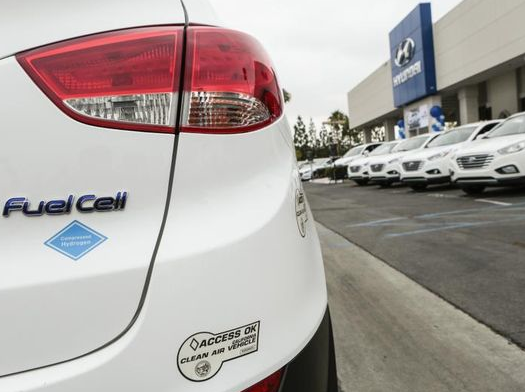At the Los Angeles Auto Show and San Francisco Show next month, there will be lots of focus on the commercial roll-out of hydrogen fuel cell electric vehicles. Las May, California joined Oregon and six east coast states, which together represent about a quarter of all U.S. miles driven, to commit to an infrastructure roll out to support 3.3 million hybrids and fuel-cell vehicles on their roads by 2025. To demonstrate they are serious, California just awarded a $50 million grant that will more than quadruple the number of “hydrogen highway” fueling station to 37.
Hydrogen is the most basic and universally available of all Earth elements, because it is made up of a single proton and a single electron. But it almost always exists combined with other elements as a form of matter, and separating hydrogen gas to its solitary form takes energy. However, hydrogen does produce a powerful and extremely clean source of energy to power fuel cell engines.
The positives for hydrogen as a source of energy are that: 1) it is readily available; 2) there are no harmful emissions; 3) it is environmentally non-toxic; 4) it is renewable; 5) it is highly efficient; and 6) hydrogen is three times more energy-intensive than gasoline.
The negatives for hydrogen as a source of energy are: 1) it is expensive to free it from other compounds; 2) it cannot be moved in existing petro-chemical pipelines and tank cars; 3) it is highly flammable because it is so energy-intensive; and 4) we will continue to need industrial fossil fuels to separate hydrogen.
California Governor Jerry Brown, who may be running a stealth campaign for the Democratic Presidential nomination as Hillary Clinton has been stumbling, is showcasing legislation that he passed requiring a nation-high 15.4% of all new vehicle sales to be “zero-emission” by 2025.
Battery-powered electric vehicles from Tesla (TSLA) and other manufacturers that have gained traction as the result of massive government tax subsidies and exemptions for single drivers to use the multi-passenger lanes, are beginning to be less fashionable even in the rich coastal enclaves of southern California and the Bay Area.
Despite the 29,000 battery charging stations and outlets built in the U.S.; the “range anxiety“, minimum 30-minute recharging period and purchase cost make battery powered vehicles inappropriate for commercial and most commuters’ transportation needs.
But hydrogen fuel cell cars receive the same tax subsidies and exemptions, plus the equivalent of 50-60 miles per gallon compared to gasoline engines, and only five minutes fill-up time for a typical range of approximately 50 miles on a fill-up.
The 2014 auto shows will heavily focus on the next wave of low- and zero-emission vehicles, according to Brendan Flynn, director of marketing and communication for the shows. He said, “Where once we saw the promise of electric vehicles–that’s here already. Now we see the promise of hydrogen fuel cell vehicles.”
One of the biggest boosters for fuel cell vehicles should be the California oil companies and refineries that produce hydrogen used for industrial purposes from natural gas. They could easily produce all the fuel cell hydrogen demanded and broadly offer hydrogen fuel at their gas stations.
But several such companies–including Chevron, Exxon, Shell and BP–have backed out of the California Fuel Cell Partnership, a joint government-industry group to promotes hydrogen cars, after the Brown administration made unrelated demands, according to CBS in San Francisco.
The $50 million California grant to quadruple the number of hydrogen fueling stations is good news to launch the hydrogen highway. But unlike battery-powered vehicles that need subsidies and preferences to survive, fuel cell vehicles could be an economically alternative to gasoline–if the state’s oil companies and refineries can be convinced to participate.
Chriss Street suggests that if you are interested in California business, please click on “Bill Gross offers PIMCO Staff a Farewell Letter from Hell“
Photo: Bret Hartman/AP

COMMENTS
Please let us know if you're having issues with commenting.